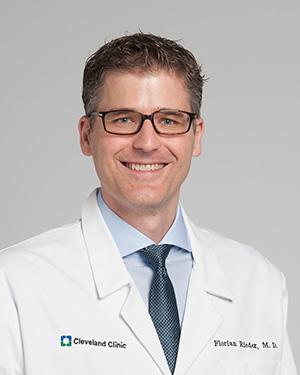Research News
08/28/2020
NIH Awards Grant to Study Creeping Fat and Develop Crohn’s Disease Treatments
Dr. Rieder seeks to identify new mechanisms responsible for fibrosis and stricture formation that leads to the development of novel preventive and therapeutic treatments for Crohn’s disease.

The National Institute of Diabetes and Digestive and Kidney Diseases, part of the National Institutes of Health, has awarded Florian Rieder, MD, a 5-year, $2 million grant to explore new mechanistic understandings of intestinal strictures and their link to the development of creeping fat in patients with Crohn’s disease (CD). This is the first R01 grant awarded to Dr. Rieder, a physician-scientist and staff member in the Departments of Inflammation and Immunity and Gastroenterology, Hepatology and Nutrition (part of the Digestive Disease & Surgery Institute).
“Securing an R01 grant is a big step in the career of a scientist because it signifies a transition to research independence and is a recognition of success among your peers,” said Dr. Rieder. “Being awarded this grant has also been a confirmation of the novelty and originality of our research. The phenomenon of creeping fat was identified over 100 years ago, yet we still don’t understand its biology, which is essential in moving forward to find novel therapies for patients with CD.”
More than 80 percent of patients with Crohn’s disease who develop intestinal strictures have creeping fat in the same location. The creeping fat comes in direct contact with the intestinal muscle and causes obstructions when the muscle thickens. As a result, CD patients experience a waxing and waning of inflammation throughout their lifetimes with intestinal obstructions that ultimately require surgery.
This new award will support research that in the short-term delves into novel cellular and molecular mechanisms of intestinal stricture formation and in the long-term fosters the development of new drugs.
Taking a non-traditional approach
Most scientists have long assumed that immune cells are central players in intestinal stricture formation. The Rieder lab will deviate from this traditional notion that immune cell-driven extracellular matrix deposition causes fibrosis and stricture formation. Instead, they will focus on extraluminal factors that may play a role in the process, including smooth muscle hyperplasia (increased tissue mass due to cell proliferation). This work is in collaboration with several other Lerner Research Institute investigators, namely David Van Wagoner, PhD; Thaddeus Stappenbeck, MD, PhD; J. Mark Brown, PhD; Claudio Fiocchi, MD; and Mitchell Olman, MD.
“Our project aims to develop novel preventive and therapeutic approaches through a mechanistic understanding of intestinal stricture formation,” said Rieder. “Currently, there is essentially no mechanistic data linking creeping fat with intestinal stricture formation or explaining creeping fat formation. Instead of focusing largely on immune cell function, we want to take a closer look at fat cell metabolism and its possible role in disease pathology.”
By developing an understanding of the formation of blockages, prevention and treatment, this study will explore a new CD paradigm associated with intestinal strictures and will ultimately be beneficial to more than half of CD patients who would benefit from this novel therapy.
Funding for this research began with a Co-Laboratories Award, an internally funded award that encourages start up collaborations. The award connected Drs. Rieder and Van Wagoner, a staff member in the Department of Cardiovascular & Metabolic Sciences who investigates atrial fibrillation and age-related cardiac arrhythmia, to team up to uncover how fat cells contribute to CD-related fibrosis and intestinal narrowing.
Image: Factors released by creeping fat (yellow) influence a thickening of the intestinal muscularis propria (red), leading to stricture formation in the inflamed Crohn’s disease intestine.
Featured Experts
News Category
Related News
Research areas
Want To Support Ground-Breaking Research at Cleveland Clinic?
Discover how you can help Cleveland Clinic save lives and continue to lead the transformation of healthcare.
Give to Cleveland Clinic